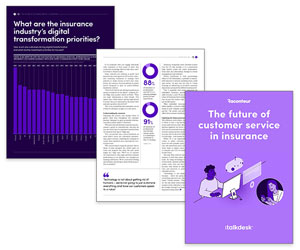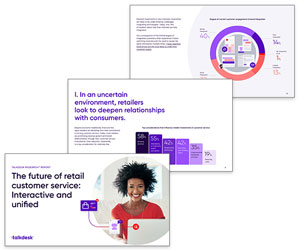Paul Cooper looks at why it’s important to learn from the innovators if you want to keep customers loyal.
Have you noticed that the majority of organisations who year in, year out, give great customer service and are recognised for it, aren’t the ones who got in trouble in the recession?
Of course, there may be some exceptions to prove my rule wrong before the year is out, but in the meantime, there is proof yet again that giving great service is not only the best way to make money long-term but it will also to keep your customers through the good and the bad times. And not only that – it will keep the best staff as well.
They will also be the ones who are the most reluctant to shed staff in the difficult times – they care about their people and realise that it’s the employees that have got their organisation where it is today.
Back to the future
Back in the 70s, 80s and 90s, most organisations would have a restructure now and again, introduce voluntary redundancies to (allegedly) improve efficiency and then find that all that happened was their best people left and the poor ones stayed, leaving them handicapped to come out the other side of the problem (Crime 1). This forced them to waste valuable time, energy and cost on re-recruiting and training people to get back to speed.
I thought these crazy ideas had been ditched, but no, we saw them all playing out again 2009-12 as organisations got into panic mode and thought short-term, yet again.
Then, of course, there is the whole issue of customers. It costs around 8-10 times more to gain new customers than keep the ones you have, so where do most organisations spend their marketing money? On trying to gain new customers, of course! (Crime 2).
They often compound this basic error by offering better deals to prospects than they do to long-term loyal customers, almost abandoning their loyal customer base when it comes to follow-up service and after-sales care.
Sales calls are more important than customer service
How many times do we hear of organisations with 20 sales phone lines, always available (0800), and 3 customer service lines (“your call is important to us!”), which are always engaged and are often 0870 premium numbers?
It makes you wonder why organisations spent millions on CRM systems to know their customers better just so they can abandon them.
Don’t cry wolf
Crime 3 in the recession was committed by the organisations that believed that they could use marketing to get themselves out of a hole by telling the world they’re great at customer service when they weren’t. We’ve seen this before and it never works, unlike with products where, selectively, a great marketing department can get the public to believe in something that may not be quite as good as it sounds.
We’ve seen it before with a well-known high-street store, a major supermarket and an airline, all in the last five years. The public just doesn’t buy it.
“We’re great at service!” they cry. “Oh no you’re not!” we respond. And yet, if they bothered to actually get great at it, there is no more powerful marketing platform in the world.
Those that get it right, like airlines Emirates and Singapore, supermarkets such as Waitrose, high-street stores such as Boots and John Lewis, and banks such as First Direct, can proudly boast of being great and we all nod sagely.
And the last crime that happened in the recession was again, of course, committed by the worst organisations: a retreat by management from the real needs of the business and the customer, which required mountains of analysis work, poring over reports for trends and new ideas, and so more meetings and discussions than ever.
Reverse business psychology
What the crisis actually needed, and got from the excellent organisations, was more hands-on, back-to-the-floor living.
It also required working even more closely with staff and customers, picking up trends on the spot, hearing what customers really wanted and then acting on it fast.
It needed quick thinking, responsive management who cared for their people and their customers, with a passion that led and motivated staff and was picked up on by them so they would then give discretionary work, new ideas and sales opportunities, and, in extreme cases, would even take a temporary cut in salary (because they cared and shared the burden).
Most importantly, it led to these organisations having a head start as we now come out the other side – still sooner than some doomsayers expected.
Quite a large part of this whole issue could justifiably be considered as having been made even worse by some elements in the media, as large chunks of the general and broadcast media just waited for the next bad-news story and disaster.
I, on the other hand, applaud those organisations out there who announced increases to their workforces, expansions of their stores and distribution centres, and increased footfall and turnover as soon as they could.
They are the ones who chose not to learn from the ‘dinosaur’ organisations who only know the practice of cutting costs, reducing staff levels, and to hell with the loyal customers.

Paul Cooper
I look forward to acknowledging, and working with, all of these positive, and successful, organisations now we are on the other side of the downturn. May they lead us all to future success, in the right way.
With thanks to Paul A Cooper, Customer Service Consultant
Author: Jo Robinson
Published On: 27th Nov 2013 - Last modified: 26th May 2017
Read more about - Call Centre Management, Customer Service, Paul Cooper




















great post – hear hear
i would also point companies in the direction of making it easy (research done by Harvard)
Customer service on 084, 087 and 09 numbers will be illegal in many business sectors by 12 June 2014.
Legislation (SI:2013/3134) tabled by BIS on 13 December 2013 will pass into law on 22 January 2014.
Public perception of John Lewis’ legendary customer service was severely dented the moment they adopted an 0844 telephone number.
“22 January 2014”
Correction: 18 February 2014.